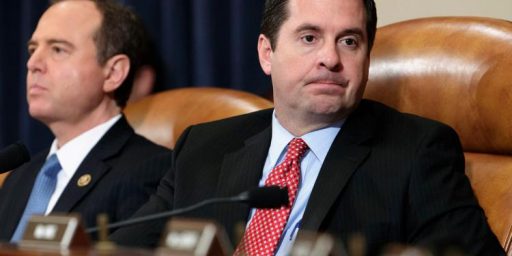Bush Reverses Course, Puts NSA Wiretaps Under FISA
After spending more than a year arguing that it had the legal authority to bypass the Foreign Intelligence Surveillance Act (FISA) to authorize NSA surveillance of suspected terrorists–and that doing so was crucial to our national security–the Bush administration announced yesterday that it has reversed course.
AP’s Lara Jakes Jordan:
Attorney General Alberto Gonzales told senators in a letter Wednesday that “any electronic surveillance that was occurring as part of the Terrorist Surveillance Program will now be conducted subject to the approval of the Foreign Intelligence Surveillance Court.”
Gonzales announced the change on the eve of his appearance before the Senate Judiciary Committee, his first since the committee came under control of Democrats after the November elections. Congressional intelligence committees had already been briefed on the shift. Gonzales said Bush would not reauthorize the program once it expires. The court already has approved at least one warrant to conduct surveillance involving a person suspected of having ties to al-Qaida or an associated terror group, Justice officials said.
White House press secretary Tony Snow said the administration is satisfied with new rules adopted by the FISA court to address administration officials’ concerns about national security. Snow could not explain why those concerns were not addressed before the program began.
[…]
Last August, a federal judge in Detroit declared the spying program unconstitutional, saying it violated the rights to free speech and privacy and the separation of powers. In October, a three-judge panel of the Cincinnati-based appeals court ruled that the administration could keep the program in place while it appeals the Detroit decision. That appeal, which was scheduled to be heard on Jan. 31, will now likely be rendered moot, said one Justice Department official who spoke on condition of anonymity because the government has not yet officially decided whether to drop its ca
Eric Lichtblau and David Johnston of NYT add,
The Justice Department said it had worked out an “innovative” arrangement with the Foreign Intelligence Surveillance Court that provided the “necessary speed and agility” to provide court approval to monitor international communications of people inside the United States without jeopardizing national security.
[…]
Democrats praised the administration’s decision, but said it should have come much sooner. “The announcement today is welcome news,” said Senator John D. Rockefeller IV, the West Virginia Democrat who leads the Intelligence Committee. “But it is also confirmation that the administration’s go-it-alone approach, effectively excluding Congress and the courts and operating outside the law, was unnecessary.”
[…]
Since the surveillance program was publicly disclosed in December 2005 by The New York Times, the White House has maintained, in scores of court filings, policy papers and press statements, that the president has the inherent power to conduct wiretaps without a court warrant even though a 1978 law put intelligence surveillance under judicial review. The administration failed to win Congressional approval for the program last year after months of lobbying, and some Democrats are still trying to ban it outright.
The administration continued to assert on Wednesday that the N.S.A. program had operated legally, but it also said the time had come to allow the intelligence surveillance court, known as the FISA court, to review all warrants on all wiretaps in terrorism investigations. “There’s obviously an advantage to having all three branches involved,” said a senior Justice Department official, who briefed reporters on the decision on condition of anonymity. “This issue of the terrorist surveillance program is one that has been under intense public debate and scrutiny on the Hill, and just considering all these circumstances, the president determined that this is the appropriate course.”
[…]
Justice Department officials said that the FISA court orders, which were not made public, were not a broad approval of the surveillance program as a whole, an idea that was proposed last year in Congressional debate over the program. They strongly suggested that the orders secured from the court were for individual targets, but they refused to provide details of the process used to identify targets — or how court approval had been expedited — because they said it remained classified. The senior Justice Department official said that discussing “the mechanics of the orders” could compromise intelligence activities.
Justice Department officials would not describe whether the court had agreed to new procedures to streamline the process of issuing orders or accepted new standards to make it easier for the government to get approval to monitor suspect e-mail and phone communications.
But the officials suggested that the effort to obtain the court’s approval for orders on Jan. 10 was not easy. “These aren’t some sort of advisory rulings,” one official said. “These are orders issued by the FISA court, not some cookie-cutter order. These orders are complex. It took a long time to work on this.”
The officials said the new approach was based on evolving legal interpretations of the foreign surveillance law by the Justice Department, changes in the foreign surveillance statute in recent years and precedents set by the FISA court in approving specific requests to conduct electronic monitoring.
WaPo’s Dan Eggen apparently has more trouble getting DoJ officials to talk:
Officials would not say, for example, whether the administration will be required to seek a warrant for each person it wants to monitor or whether the FISA court has issued a broader set of orders to cover multiple cases. Authorities also would not say how many court orders are involved or which judge on the surveillance court had issued them.
If the NYT report is correct, it is the former.
TPM has scans of the Gonzalez letter which, not surprisingly, does not provide a lot of detail.
Glenn Greenwald is not quite sure what to make of things but believes this reversal by the administration is “Nothing to celebrate.”
[U]ltimately, there are only two options — (1) the administration is now complying fully and exclusively with FISA when eavesdropping, in which case all of its prior claims that it could not do so and still fight against The Terrorists are false, or (2) the administration has changed its eavesdropping program some, but it is still not fully complying with FISA, in which case nothing of significance has changed (at least on the lawbreaking issues) because the administration is still violating the law.
Regardless, Mark Levin is hopping mad:
Is there no principle subject to negotiation? Is there no course subject to reversal? For the Bush administration to argue for years that this program, as operated, was critical to our national security and fell within the president’s Constitutional authority, to then turnaround and surrender presidential authority this way is disgraceful. The administration is repudiating all the arguments it has made in testimony, legal briefs, and public statements. This goes to the heart of the White House’s credibility. How can it cast away such a fundamental position of principle and law like this?
(Editor’s note: Shouldn’t there be a “NOT” in both of the first two sentences?) Perhaps his people have actually found an “innovative” way to simultaneously comply with the letter of FISA and yet accomplish the program’s objectives?
Orin Kerr speculates about one possibility:
But it sounds to me like the FISA Court judges have agreed to issue anticipatory warrants. The traditional warrant process requires the government to write up the facts in an application and let the judge decide whether those facts amount to probable cause. If you were looking for a way to speed up that process — and both sides were in a mood to be “innovative” — one fairly straightfoward alternative would be to use anticipatory warrants.
An anticipatory warrant lets the government conduct surveillance when a specific set of triggering facts occurs. The judge agrees ahead of time that if those facts occur, probable cause will exist and the monitoring can occur under the warrant. The idea is that there isn’t enough time to get a warrant right at that second, so the warrant can be “pre-approved” by the Judge and used by the government when the triggering event happens.
It strikes me that an “anticipatory” warrant pretty much vitiates the 4th Amendment requirement that “no Warrants shall issue, but upon probable cause, supported by Oath or affirmation, and particularly describing the place to be searched, and the persons or things to be seized.”
Of course, the problem with such speculation is that we (or at least, *I*) don’t fully understand what the NSA program entails, making it difficult to figure out how it fits into FISA, let alone what loopholes there might be. My initial understanding was that it was a data mining program rather than “eavesdropping” in a specific, personal sense. That was later denied in congressional testimony but without much information about how the program operate(s/d).






James: You might want to check your headline.
“Reverses COURSE” rather than “Reverses COURT”
Fixed! What I get for blogging at 5 am.
There’s already a provision in place for retroactive warrants, so I don’t know why anticipatory ones would be such a big deal.